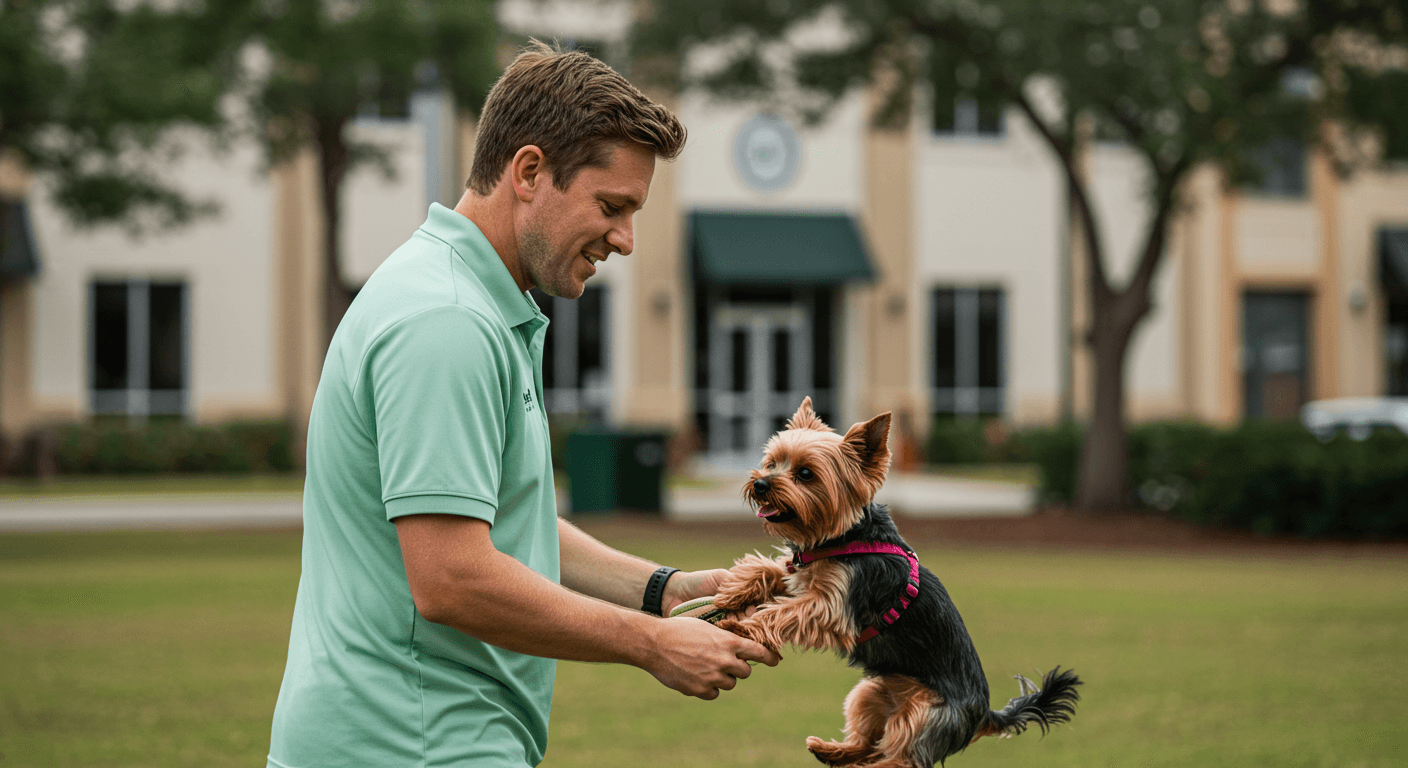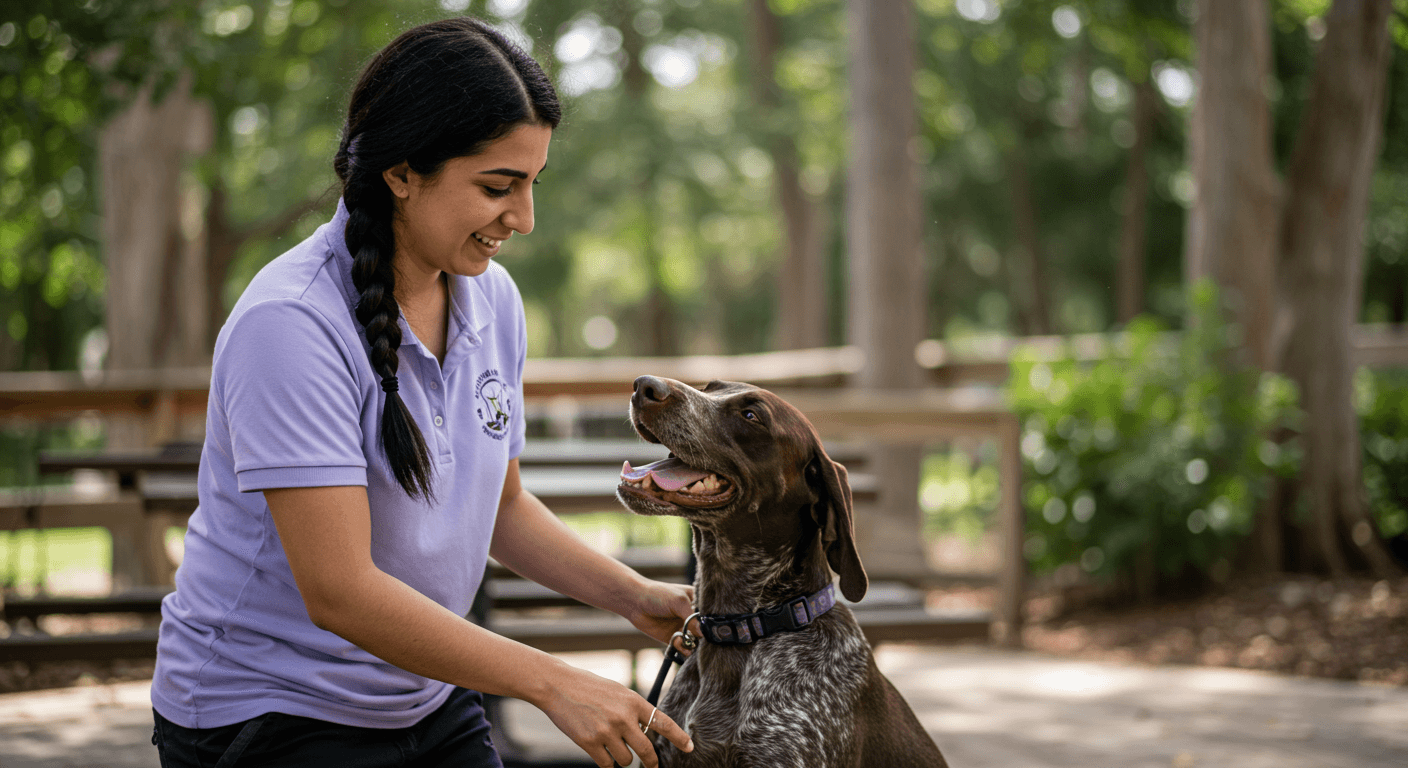Your Complete Guide to Choosing a Dog Trainer in Florida
Living with a dog in Florida means navigating beaches, humidity, and year-round outdoor activities. Your dog needs to handle distractions like wildlife, tourists, and crowded public spaces with calm confidence. Whether you’re walking the Riverwalk in Tampa, visiting dog-friendly patios in Miami, or exploring trails in Jacksonville, finding the right professional dog trainer makes all the difference.
Florida’s unique environment brings specific challenges. Your dog might need help with leash manners around alligators, staying calm near boats and jet skis, or learning to ignore the constant foot traffic in popular tourist areas. The right training program prepares your dog for real Florida life.
How to Choose the Right Trainer
Start by looking for someone who understands Florida’s specific challenges and uses positive reinforcement training. Your dog should learn skills that matter here, like staying focused near beaches, handling heat breaks during training sessions, and behaving politely in the pet-friendly spaces Florida is known for.
Credentials help you compare trainers quickly. Look for dog trainer certifications like CPDT-KA, KPA-CTP, or IAABC-CDBC for behavior issues. For serious aggression or fear problems, look for CBCC-KA certification or graduates from science-based programs like CTC.
In-home dog training works best for household manners, door greetings, and basic obedience in your own space. Group classes make sense once your dog can focus around other dogs, especially before visiting busy dog-friendly restaurants or events.
Private lessons let you customize everything around your schedule and specific goals. Board and train programs can speed up results when you need intensive help with behavior modification, but make sure the trainer shows you how to maintain the progress when your dog comes home.
Common Dog Training Methods Explained

Reward-based methods create lasting behavior changes while building the trust you need for off-leash reliability. They also help you follow Florida’s various local leash laws and animal control ordinances without stress.
Basic obedience covers sit, down, stay, place, recall, and leash training so your dog can handle crowded boardwalks, outdoor dining areas, and public beaches without pulling or jumping on strangers.
Puppy training focuses on socialization, potty training, bite inhibition, crate comfort, and early leash skills. Starting early prevents bad habits and helps your puppy adjust to Florida’s busy, tourist-heavy environment.
Behavior modification addresses fear, reactivity, resource guarding, or separation anxiety through careful desensitization and counterconditioning. For complex cases, ask if your trainer collaborates with veterinary behaviorists.
Dog training classes and group classes help your dog practice good manners around other dogs and people. The best classes screen participants carefully, give dogs enough space, and teach calm focus rather than just excitement.
Service dog training and therapy dog training require extra structure, public-access skills, and a clear step-by-step program. These specialized training sessions demand consistency and a trainer experienced in the specific requirements.
Stay away from trainers who rely on fear, intimidation, or pain to get results. Humane methods are safer, easier to maintain long-term, and keep your dog confident in Florida’s unpredictable public environments.
Average Cost of Dog Training in Florida (Updated for 2025)
Prices across Florida depend on the trainer’s experience, session length, and whether you’re in a major metro area or smaller town. Here’s what most Florida dog owners are paying in 2025.
| Service Type | Average Cost (Florida) |
|---|---|
| Puppy classes (4-6 weeks) | $140-$280 total |
| Group obedience classes (4-6 weeks) | $150-$320 total |
| Private lessons (60-90 min) | $100-$200 per session |
| In-home training packages (4-6 visits) | $400-$950 total |
| Day training (trainer works your dog) | $400-$900 per week |
| Behavior consult (initial session) | $140-$260 |
| Board and train (2-4 weeks) | $1,800-$5,000 total |
Expect higher rates in Miami, Tampa, Orlando, and Jacksonville compared to smaller communities. Travel fees may apply if your trainer drives long distances, and complex behavior work typically costs more than basic puppy training.
Make sure you understand what’s included, how progress gets tracked, and whether the trainer offers a free consultation before you commit.
Questions to Ask a Potential Dog Trainer
- What training methods do you use, and how do you keep sessions positive and low-stress?
- What credentials do you have, and do you keep up with continuing education like CPDT-KSA?
- How will you customize the training program for my dog’s specific needs and our Florida lifestyle?
- Do you offer in-home training, group classes, or day training, and which approach fits my goals best?
- How will we measure progress and know when to add more distractions?
- What are the total costs, including travel fees, and what’s your cancellation policy?
- Do you carry liability insurance, and can you show me proof?
- For behavior problems, will you work with my veterinarian if needed?
- What should I practice between training sessions to help my dog keep improving?
- How do you handle training in Florida’s heat and outdoor conditions?
Local Florida Rules and Considerations
Florida’s leash laws and animal control regulations vary by county and city, so check your local ordinances. Most municipalities require leashes in public spaces and current rabies vaccination.
Leashes are required in nearly all public areas except designated off-leash dog parks. Keep a standard 6-foot leash with you for beaches, parks, and tourist areas.
Florida law requires current rabies vaccination for all dogs over four months old. Your dog must wear a rabies tag at all times, and you can get vaccinations through county animal services or your regular vet.
Excessive barking can violate local noise ordinances, especially in densely populated areas and condos. Work with your trainer on separation anxiety and alert barking before neighbors complain.
Florida doesn’t require special licenses for dog trainers. However, if a trainer operates a boarding facility as part of board and train programs, they may need a kennel license from the Florida Department of Agriculture and Consumer Services.
Insurance requirements vary by location. Professional dog trainers should carry liability insurance, especially if they conduct training sessions in public parks or offer dog training services on commercial properties.
Many Florida counties have specific ordinances about dangerous dogs and breed restrictions in certain housing. Check with your county animal control office for local rules that might affect your training needs.
Local Florida Resources for Dog Owners
These spots give you great places to practice obedience training, work on recall, and provide safe enrichment for your dog. Always follow posted rules and etiquette guidelines.
- Dog Beach at Fort De Soto Park in Pinellas County offers off-leash beach access where dogs can swim and practice recalls in a controlled environment
- Bark Park at Snyder Park in Fort Lauderdale provides fenced areas perfect for socialization and off-leash practice
- Happy Tails Dog Park in Clearwater features separate areas for large and small dogs with plenty of space for training exercises
- Jacksonville Beach allows leashed dogs on the beach before 9 AM and after 5 PM, great for leash training around distractions
- Amelia Island beaches welcome leashed dogs year-round, offering excellent opportunities to practice calm behavior near wildlife and tourists

FAQs
How much does in-home dog training cost?
Most Florida trainers charge $100-$200 per in-home session, with package discounts available when you buy multiple visits. Behavior modification for aggression, reactivity, or separation anxiety typically starts at the higher end of that range.
Is in-home dog training worth it?
Absolutely, because you’re addressing problems exactly where they happen. Your trainer can fix door manners, jumping on guests, counter-surfing, and yard reactivity right at home, then move outside to practice leash skills in your actual neighborhood with real distractions.
Can you pay someone to house train your dog?
Yes, many trainers offer puppy programs that include potty training, crate routines, and daily schedules. Day training can speed up the process while teaching you how to maintain the progress after the trainer leaves.
What is the 3-3-3 rule for dog training?
This timeline helps set realistic expectations for new or adopted dogs: expect about 3 days for your dog to decompress, 3 weeks to learn your routines, and 3 months to feel completely settled. Good training programs work with this natural adjustment period rather than rushing results.
How long will it take to reach my training goals?
Most puppies and friendly adult dogs show solid progress within 4-8 weeks if you practice daily. Fear, reactivity, or aggressive dog training typically requires several months of careful behavior modification with gradual increases in difficulty.
What should I bring to group classes?
Pack a flat collar or harness, a 6-foot leash, high-value treats, water, and current vaccination records if your trainer requests them. Leave retractable leashes at home for safety reasons.
What’s the leash law in Florida?
Leash laws vary by city and county across Florida. Most municipalities require dogs to be leashed and under control in all public areas except designated off-leash dog parks. Check your local ordinances for specific requirements.
Do I need a dog license in Florida?
Most Florida counties don't require general pet licenses, but some cities do. Contact your local animal control office to confirm. You must keep your dog’s rabies vaccination current and the tag on their collar at all times.
What shots does my dog need in Florida?
Florida law requires rabies vaccination for all dogs over four months old. Your veterinarian may also recommend distemper-parvo, bordetella, and leptospirosis based on your dog’s lifestyle and exposure risks.
Are dog trainers required to be licensed in Florida?
No special licenses exist for dog trainers in Florida. Trainers follow normal business regulations, but if they offer board and train services with overnight boarding, their facility may need a kennel license from the Florida Department of Agriculture and Consumer Services.
Where can I practice off-leash recall?
Use fenced dog parks throughout Florida to keep things safe and legal. Many counties offer multiple dog parks with separate areas for large and small dogs. Try visiting during quieter morning hours when you’re starting out.
Which dog parks allow training around Florida?
Most dog parks welcome training exercises as long as you’re not disrupting other visitors. Popular options include Bark Park at Snyder Park in Fort Lauderdale, Happy Tails Dog Park in Clearwater, and the many county-run dog parks across the state. Always check posted rules before using the space for training sessions.
What beaches or trails allow dogs for training?
Many Florida beaches allow leashed dogs during certain hours. Jacksonville Beach, Amelia Island, and Fort De Soto’s Dog Beach are excellent choices. State parks like Anastasia State Park and Honeymoon Island State Park welcome leashed dogs on trails, perfect for teaching calm focus around wildlife, families, and other beachgoers.
How do I find a certified dog trainer near me?
Look for trainers who list credentials like CPDT-KA, KPA-CTP, or IAABC-CDBC on their websites. Ask about their experience with Florida-specific challenges like wildlife distractions, heat management during training, and working in busy tourist areas. A free evaluation can help you decide if the trainer understands your needs.
What if my dog is reactive to wildlife?
Florida’s abundant wildlife, including birds, squirrels, and occasionally alligators, can trigger reactivity. Expert dog trainers experienced with behavior modification can help your dog learn calm focus through careful desensitization. Start training in low-distraction environments and gradually work up to areas with more wildlife.
Can I train my dog to be calm around water?
Yes, many Florida trainers specialize in helping dogs become comfortable around pools, beaches, and boats. Whether you want a well-behaved dog for kayaking trips or just need your pup to stay calm near backyard pools, look for a trainer who understands water safety and can help your dog build positive associations.
The right combination of patient training, humane methods, and consistent practice in Florida’s unique environment will help your dog become a confident, well-behaved companion. Whether you’re dealing with puppy challenges or working through complex behavior issues, finding a professional who understands life in the Sunshine State makes the journey smoother for everyone.
